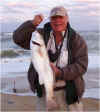| 10-18-04
Avon, N.C.--
Three years ago at this surf-fishing mecca, native North Carolinian Terry
Shive administered my first lesson in fishing for red drum, (Sciaenops
ocellata), a k a “redfish,” “channel bass,” or just plain “drum.”
I watched as he caught a 43-incher on the Avon Fishing Pier while telling
me about some 40 years of questing unsuccessfully for giants of the species.
Last week Terry, a great fishing friend who now has caught four 40-inch-plus
fish, administered another lesson at a sand/surf place called the
“The Point,” a hangout for surf-fishing anglers of many persuasions. In
the hearts of each there is a desire to beach one of these monsters.
Home for the red drum, at least in the summer months, could be anywhere
along the Atlantic Coast of this country, but the species migrates. When
the fall migration is in full swing the famed Outer Banks of North Carolina
is hard to beat.
This, of course, (not to mention many other saltwater species) lures
me to the Outer Banks every year, most often in late summer or early fall
when the drums are “in.” And so it was that I spent the last two weeks
pursuing drum, and other denizens, here.
I had not seen Terry for three years. But toward the end of my first
week in a seaside cottage, Terry knocked on the door to surprise me totally.
Farm chores dictated that he couldn’t stay long, but we managed two days
of surf fishing, along with his son, Jason, and Max “Jerry” Varnadore.
That was time enough for another great lesson in drum fishing. This time
Jason was the star with a 39-incher, and I lucked into a 27-incher, which
was just right for baking.
North Carolina regulations allow an angler to keep one drum per day
in the 18-27 inch range, but all drum smaller that 18 inches and larger
than 27 inches must be returned immediately.
Drum fishing is a bit like dove hunting in that it is a social activity.
Anglers who try their luck with the big drums in the surf of these barrier
islands come in small groups. They usually come in four-wheel-drive vehicles
adorned with rod racks on the front bumper, huge coolers on the back bumper,
and interiors stuffed with enough fishing gear for a young army.
Rods range up to 12 or 13 feet and are capable of throwing six to eight
ounces of weight (lead sinkers) 100 yards or more. Constant incoming waves
that ebb and flow keep wader-clad anglers at bay. But once the bait is
far out the rod is stashed in a holder (a round plastic pipe that is pushed
far into the sand).
With the reel drags set fairly light, the anglers sit around and talk
or use smaller rods (with lighter line) to fish for smaller fish in the
surf. Some of the smaller fish are used as cut bait for drum, but some
of them are table fare in their own right.
During one noonish lull last Monday, Terry fired up a one-burner Coleman
camp stove on the tailgate of his big pickup truck and soon was serving
hot soup. That was followed by hotdogs with mustard, mayonnaise and coleslaw
(a popular southern dish).
Fishing had been slow that morning, but we had watched as anglers down
the beech landed a fish that was well over 35 inches. Smaller fish--including
pompano, small blues (known as Taylor blues), and whiting--also were being
taken.
Toward mid-afternoon, as the tide continued to rise, drum topping the
35-inch mark were taken occasionally up and down the beach to keep our
hopes high.
When an area south of our position cleared out, Terry told Jason it
appeared to be a good bet. Jason complied and in less than half an hour
he was snaking his 39-incher onto the gently sloping sand. Shortly before
Jason scored, I landed a 27-incher that qualified for a spot in my oven,
and other anglers were snaking in large fish in both directions.
As darkness closed in on this raw fall day, the caravan of four wheelers
loaded with tired anglers headed back over the five to seven miles of sand
to hard roads and civilization.
Click on thumbnail
image for enlarged view.

|

|
| Jason
Shive prepares to wade into the surf and send his 39-inch drum back to
sea. |
My
27-incher barely made it into my oven . . . another fraction of an inch
would have made him too big to keep. Note black tail spots on fish, a surefire
identifying characteristic. |
|

